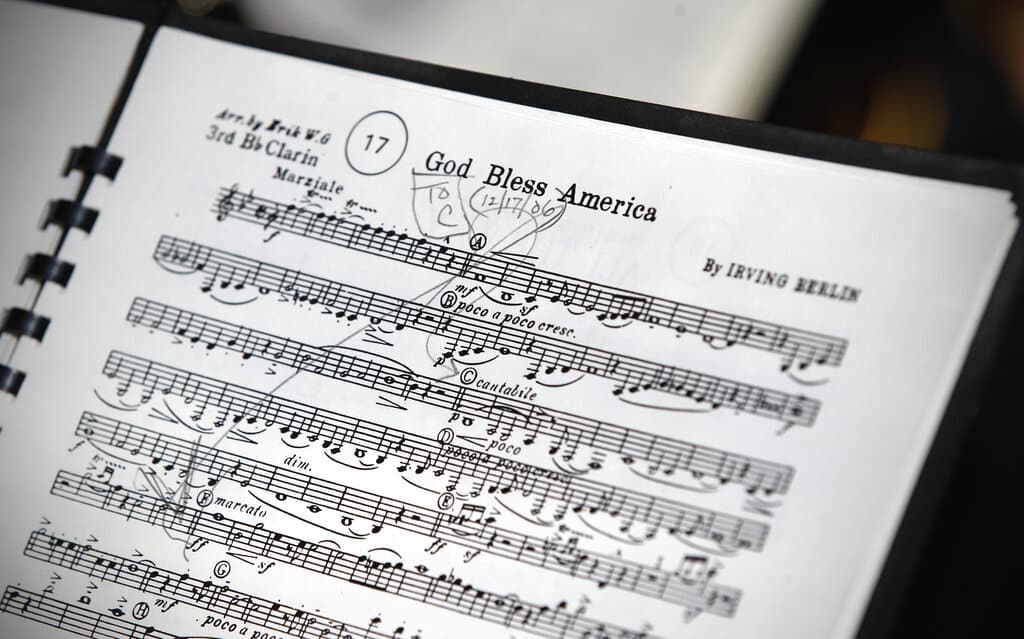The title of Irving Berlin’s song “God Bless America” has become a standard phrase ending presidential speeches. Berlin wrote the song during World War II and it was popularized by Kate Smith in 1938.
The first modern president who used the words at the end of a speech was President Richard Nixon, who did so somewhat inauspiciously on April 30, 1973, when he was explaining how top officials had resigned as a result of the Watergate break-in (Domke and Coe 2008).
Although the phrase laid dormant in presidential speeches for a time, it was renewed with fervor by President Ronald Reagan and has been a fairly regular staple of speeches ever since. Reagan reintroduced the phrase even before becoming president when he accepted the Republican nomination for president on July 17, 1980. Noting that he was going off script and he was “worried over whether I should do it,” he said that “I am more afraid not to.” After bowing his head for 13 seconds, he ended with “God bless America” (Scher 2015). From Reagan’s inauguration through six years of the George W. Bush presidency, presidents used the “God Bless America” phrase 49 times in 120 major speeches (Domke and Coe 2008).
Quoting from David Domke and Kevin Coe, who authored “The God Strategy: How Religion Became a Political Weapon in America,” an article in the Huffington Post observes that the phrase has become “politically expedient,” “a simple way for presidents and politicians of all stripes to pass the God and Country test,” and “the verbal equivalent of donning an American flag lapel pin.” They explain that “few notice if you do it, but many notice if you don’t” (2014).
First Amendment allows for broad freedom of religious expression
Although the Establishment Clause of the First Amendment prohibits the Congress from adopting any laws “respecting the establishment of religion,” the corresponding free exercise clause and other First Amendment provisions for freedom of speech and press, allow for broad freedom of religious expression.
Such expression is often mixed with political or nationalist views. Even those who would not identify themselves as Christian nationalists, are, if they are religious, likely to make some associations between God and country.
Other examples of such religious links with government include:
- the placing of the words “In God We Trust” on currency and the adoption of the phrase as the national motto;
- the inclusion of the words “under God” in the salute to the U.S. flag;
- the yearly National Prayer Breakfast; and
- patriotic songs like the national anthem (which includes the words “In God is our trust”), “America the Beautiful,” Berlin’s “God Bless America,” and Lee Greenwood’s “God bless the U.S.A” (Vile 2022, 107).
President Donald J. Trump who has pushed Christian nationalism, is particularly fond of Lee Greenwood’s song, and has marketed the “God Bless the USA Bible.” The end of Trump’s second inaugural address on Jan. 20, 2025, included “God bless America.”
Ambiguity in 'God bless America' lyrics
There continues to be some ambiguity in the phrase “God bless America,” which can be interpreted “as either requesting God’s blessings or as assuming that they are the nation’s due” (Vile 2022, 107). In contrasting “God Bless America” with “America the Beautiful,” which was written by Katherine Lee Bates in 1895, one observer has noted that whereas Bates’s song “humbly asked for God’s ‘grace,’ Berlin’s “has a palpable sense of Manifest Destiny [American expansionism] and is “American exceptionalism made manifest in song” (Pedelty 2012, 51).
Presidents continue to use the words both as a prayer for God’s blessing and as a statement of God’s special favor.
John R. Vile is a political science professor and dean of the Honors College at Middle Tennessee State University.

